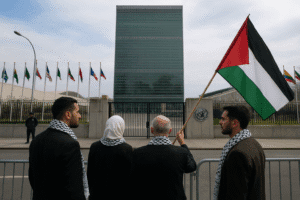The UN’s Doorstep Dilemma: US Visa Ban on Palestinian Delegation Tests International Law and the Path to Peace
In a significant diplomatic escalation, the United States has revoked visas for Palestinian President Mahmoud Abbas and over 80 officials, barring them from next month’s UN General Assembly. The US justified the move by accusing Palestinian leadership of failing to renounce terrorism and incitement, framing it as a matter of national security. Palestine condemned the decision as a violation of international law and US obligations as the UN host. The timing is critical, preventing Palestine from rallying support amidst the Gaza war and a growing humanitarian crisis.
Furthermore, it counteracts a wave of planned recognitions of Palestinian statehood by US allies like France and Australia. This action effectively silences a key voice at the world’s primary diplomatic forum, deepening fractures in the peace process and challenging the very principle of multilateral dialogue.

The UN’s Doorstep Dilemma: US Visa Ban on Palestinian Delegation Tests International Law and the Path to Peace
In a move that has escalated a diplomatic war of words, the United States has blocked Palestinian President Mahmoud Abbas and a delegation of over 80 officials from attending the United Nations’ annual General Assembly in New York this September. The decision, enacted by Secretary of State Marco Rubio, revokes existing visas and denies new applications, effectively silencing the Palestinian leadership at the world’s most prominent diplomatic gathering.
The Palestinian Authority has condemned the action as a “violation of US commitments” that “contravenes international law,” setting the stage for a profound clash between American foreign policy and its obligations as the host nation of the UN.
More Than a Snub: The Stated Reasons and the Unspoken Strategy
The U.S. State Department justified the move by citing national security interests, accusing the Palestine Liberation Organization (PLO) and the Palestinian Authority (PA) of failing to meet their commitments.
“To be considered partners for peace,” a department statement read, both groups “must consistently repudiate terrorism, and end incitement to terrorism in education, as required by U.S. law and as promised by the PLO.”
This framing is the latest in a series of hardline measures by the current administration targeting Palestinians, including the recent suspension of a program for injured Gazan children to receive medical care in the U.S. Analytically, the visa ban serves a dual purpose:
- Punitive Action: It is a direct punishment for the Palestinian leadership, whom the administration holds responsible for perpetuating conflict rather than pursuing peace on terms favorable to the U.S. and Israel.
- Strategic Silencing: The timing is critically important. The ban prevents President Abbas from using the UNGA podium to rally international support and condemn the ongoing Israeli military offensive in Gaza, which several European allies have described as causing “intolerable deaths of innocent Palestinian civilians.”
A Clash at the Crossroads of Law and Diplomacy
At the heart of the controversy is the 1947 UN Headquarters Agreement, which obligates the United States, as the host country, to allow foreign diplomats access to the United Nations. The U.S. has historically maintained it can deny visas for reasons of “security, terrorism, and foreign policy,” a loophole it has invoked in the past for other controversial figures.
However, barring an entire recognized diplomatic delegation—especially one from an UN Observer State—pushes this exception into uncharted territory. A UN spokesman stated the organization is “seeking clarification,” highlighting the institutional unease with a host country potentially undermining the principle of multilateral dialogue.
The Palestinian Ambassador to the UN, Riyad Mansour, emphasized the practical cost of this decision. Abbas was not only set to address the general debate but was also expected to attend a high-level meeting co-chaired by France and Saudi Arabia about a two-state solution—a forum the U.S. visa policy has now directly disrupted.
The Larger Geopolitical Canvas: A Shifting World Order
This incident cannot be viewed in isolation. It occurs against a backdrop of significant shifts in international opinion regarding Palestinian statehood.
Several key U.S. allies, including France, Malta, and Australia, have announced plans to formally recognize Palestine as a state at this very UN meeting. Others, like Canada and the UK, have suggested they will follow suit unless Israel meets certain conditions. The U.S. visa ban can thus be interpreted as a forceful attempt to counter this momentum and reassert a unilateral American vision for the peace process, one that is increasingly at odds with its traditional partners.
The Human Context: A Voice Silenced Amidst Crisis
The political maneuver takes place while a dire human catastrophe unfolds in Gaza. With a death toll reported by the Hamas-run health ministry exceeding 63,000 and a deepening famine claiming the lives of children, the Palestinian delegation’s mission at the UN was poised to be one of urgent humanitarian appeal as much as political posturing.
Preventing their attendance denies them a crucial platform to present their case directly to the world’s media and diplomatic corps, shifting the narrative power even further away from them.
The Road Ahead
The U.S. decision to block the Palestinian delegation is more than a diplomatic spat; it is a testament to the deeply fractured state of international peace efforts. By choosing to exclude rather than engage, the U.S. risks:
- Eroding its role as a perceived honest broker in the region.
- Alienating key allies who are moving toward recognition of Palestine.
- Undermining the principle of the UN as a forum for all voices, however inconvenient.
Ultimately, the empty chairs reserved for the Palestinian delegation in New York will speak volumes. They symbolize a broken dialogue, a divided international community, and a peace process that remains not just stalled, but actively blocked from the world stage. The path to a two-state solution seems to require a conversation that one of the most powerful players is now refusing to even hear.
You must be logged in to post a comment.